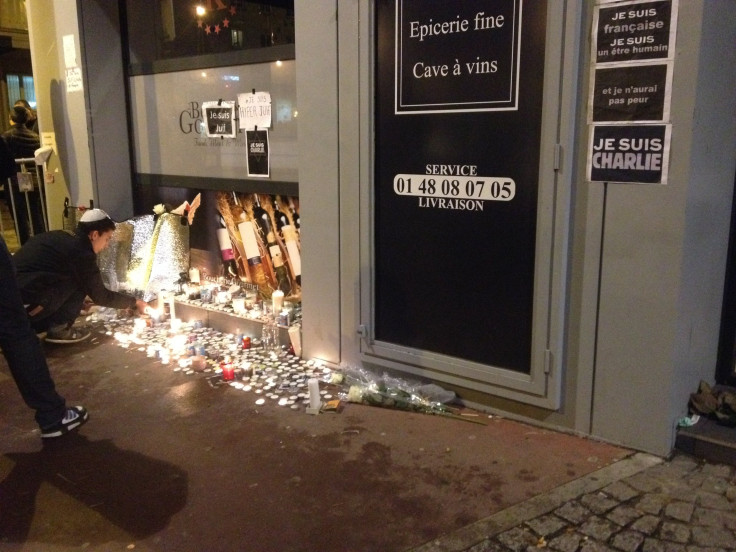After Hyper Cacher Attack, Jews And Muslims Alike Fear Religious Backlash In France

PARIS -- When the thousands who marched Saturday through Paris’ Sainte-Mante district in solidarity with the victims of the Hyper Cacher attack began to trickle away, knots of people lingered around the candlelight memorial with frayed nerves, visibly on edge after several false alarms around the city on Saturday.
What started off as a rally in defense of the freedom of expression turned into a debate on religious discrimination -- one in which Muslim and Jewish people found themselves blaming the same government for the same reason.
One day earlier, a young Muslim man had attacked Hyper Cacher, a kosher supermarket, killed four people, and barricaded himself with more than a dozen hostages before being killed in an assault by a SWAT team. He had apparently coordinated his action with the attack on the Charlie Hebdo magazine by two men bent on avenging the weekly’s cartoons lampooning the Prophet Muhammad.
In secular France, where the state makes a point of enforcing the strictly non-religious values known here as “Republican,” religion has become a flashpoint.
“The problem in France is that you can’t speak about religion,” said Beni Bouccarra, a waiter who lives down the street from Friday’s standoff in the Kosher supermarket and attended Saturday’s impromptu rally.
The man standing next to him, whom Bouccarra just met, chimed in with just one word: “Intolerance.”
“Non, not intolerance. It’s a country that’s come to a halt,” Bouccarra replied. Though the French government may prefer not to discuss the subject, he said, “each community needs to know where they came from and their religion.”
Bouccarra is Jewish and his new friend -- who asked not to be named -- is Muslim, but the inability to express themselves religiously without fear of violence or discrimination is a grievance both their communities share.
“It’s 2015, imagine yesterday we were advised not to go pray at the Synagogue,” said Charlie, a 23-year-old university student studying economic development. Authorities asked Jewish stores in Paris’ historically Jewish district, the Marais, to close up shop Friday, and temples were invited not to hold Saturday services -- all for fear of more attacks.
As one suspect in the two attacks, Hayat Boumeddiene, is still on the run, religious leaders and government officials are on high alert for another religiously motivated attack.
“Freedom of expression is a problem in France,” said Dylan, a 20-year-old French and Israeli citizen. “In France we don’t feel safe.” He has an upcoming flight to Israel booked and he’s not sure if he’s booking a return: “We’re safer in Israel,” he said, echoing a recent trend of rising Jewish emigration from France, in the wake of mounting anti-Semitic violence.
Joey, a 23-year-old university student studying audio engineering who, like the others, did not want his last name published, said he is “afraid to leave” his house. Joey lives across town in the 19th arrondissement of Paris, where there is a high concentration of Jews and Muslims. His neighborhood has always had issues, he said, but after the Hyper Cacher attack Jewish residents are living in fear.
Many feel the Islamic extremist who seized the Hyper Cacher chose the location because it was a Jewish supermarket. The terrorist, Amedy Coulibaly, in fact said as much himself.
But people from several different communities were present at the solidarity march.
“We’re not here as Jews or as journalists,” Joseph, a 24-year-old student at the Université de Lille, said. “We’re here as human beings.”
“It was necessary to meet each other here to pay homage to the victims and so [terrorists] know we’re not afraid,” said Alejandro Ronard Alem, a writer, who was at the rally.
Both anti-Semitic and anti-Islamic attacks have become frequent in France. After Wednesday’s massacre at Charlie Hebdo, when 12 people were gunned down, several mosques were attacked in retaliation. During Israel’s offensive in Gaza this summer, a man in Toulouse threw three firebombs at a Jewish community center after a pro-Palestine rally.
People gathered at the Sainte-Mante rally expressed a fear that their compatriots may not learn how to move beyond a climate of fear and retaliation. “France doesn’t take lessons from the past,” Joseph said. The country’s future, he said, and the future of its religious minorities, “is a question mark.”
© Copyright IBTimes 2024. All rights reserved.












